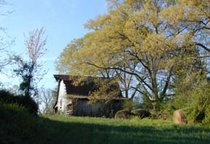The first light at the end of winter's long, cold and wet tunnel appeared this weekend. With temperatures in the 60s and no rain, it was the first time this year I've had the chance to do any real work in the garden and elsewhere.
So, I took advantage.
The first thing I did Saturday morning was sort the potatoes. I had about 15 pounds of potatoes left over from last year's harvest. They had been stored in the basement, and nearly every one of them, even the very smallest, had developed sprouts. I checked with the good folks at Ronniger's in Colorado, where I had ordered them last year, to see if there was any reason not to put those in the ground this spring.
There isn't. So, Saturday morning I sorted.
I ended up with what will be enough seed potatoes for a row of banana ("the superstar of fingerling potatoes," according to Ronniger's) potatoes. I'll also have enough Russets and various others -- French fingerlings, Yukon gold -- for another row. This morning I ordered enough from Ronniger's to fill a third row with Russets, French fingerlings and Yukon Gold.
The Russets and French fingerlings did very well last year, so I thought I would go with what has worked before. The Yukon golds were bought locally and didn't produce so well, so I thought I would give them another shot with the Colorado imports.
Growing potatoes was one of the great gardening thrills I had last year, and I hope I can duplicate it this year.
The garden
I had mentioned here before that Kenneth, the fellow who plowed my garden last fall, got enthusiastic and just about doubled the size of the plot. I got a taste of just how big he had made the garden on Saturday when I pulled out the tiller and started breaking up the ground.
The garden is now 125 feet long and about 75 feet wide. That's a very long row. I tilled for about an hour and got about a third of the plot turned over. Much more tilling in my near future.
The bees
I have been reluctant to post much about the bees lately because disaster struck about three weeks ago. We had a brief warm spell, and I had decided to put some Apistan strips in the two hive that I had left, but when I opened them up, there was nothing left but a few dead bees. Both hives had died out completely.
My guess, confirmed by my friend Jim, was that the winter was simply too long and cold and they starved to death.
This was a huge disappointment because I believe both hives to be healthy and active, and I had been looking forward to just this time so I could shift the boxes around and get them ready for the spring. Instead, I have had to call Howard and reserve some boxes of bees that he will be bringing on April 4.
The one slightly silver lining in all this is that I have plenty of drawn comb -- pure gold for the beekeeper -- so when the new bees show up, they shouldn't have any trouble getting started. I still look forward to a honey harvest in July.
The coming of spring
The first paragraph of this post described winter as long, cold and wet. The good thing about that was the "wet" part. East Tennessee made a valiant attempt to climb out of its drought this winter with goodly amounts of rain in November, December and January. The ground is moist, and nature seems anxious to take off in these last three weeks before spring officially descends.
Sunday, March 8, 2009
First light at the end of winter's long tunnel
Subscribe to:
Post Comments (Atom)



2 comments:
I'm so sorry about the bees who lay their little bee-bodies down. Last summer, late in the season, a swarm suddenly descended upon a shrub. It was like a moving brown cloud that hummed. Just as suddenly they departed.
Do you sell the honey? Do you know who sells the honey. I have heard that if you eat honey harvested from your area it will help greatly with allergy problems. I haven't been able to find anyone that harvests it in the Murfreesboro/Smyrna, TN area. If you do sell it and/or know where I can get it please email me at gdunkling1@aim.com. Thank you so much for your help.
Post a Comment